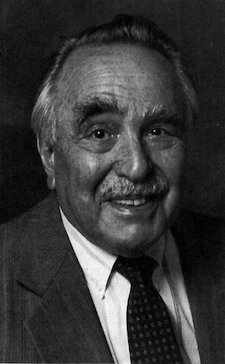ZEN MESTEREK ZEN MASTERS
« Zen főoldal
« vissza a Terebess Online nyitólapjára

Philip B. Yampolsky (1920-1996)
https://en.wikipedia.org/wiki/Philip_Yampolsky
Philip Yampolsky: Zen Translator and Scholar
by Fred Knubel
Philip Yampolsky, a leading translator and scholar of Zen Buddhism and former head of the C.V. Starr East Asian Library of Columbia University, died Sunday (July 28, 1996) in St. Luke's Hospital in New York City. He was 75 and a Manhattan resident.
He died of complications from pneumonia, said his wife, Yuiko. A scholar of Chinese and Japanese religions and a specialist in Zen studies, he was known for his analytical translations of Zen classics now used as texts in both graduate and undergraduate Asian studies courses in American universities. They include Platform Sutra of the Sixth Patriarch (1967) and The Zen Master Hakuin: Selected Writings (1971), both published by Columbia University Press.
"His many books and articles made the mysterious traditions of Zen approachable to Western audiences," Professor Ryuichi Abe, a colleague at Columbia, said today.
Dr. Yampolsky's most recent books, Selected Writings of Nichiren and Letters of Nichiren, translated and explained the works of the 13th century Buddhist thinker and reformer whose ideas inspired religious and political movements still active in Japan. They were published by Columbia University Press in 1990 and 1996, respectively.He taught at Columbia for 32 years, from 1962 to 1994, most recently as a special lecturer after retiring in 1990 as a full professor of Japanese.
From 1968 to 1981, Dr. Yampolsky was the librarian of Columbia's East Asian Library, now the C.V. Starr East Asian Library, one of the major such collections in the United States with more than 600,000 volumes in Chinese, Japanese, Korean and other languages.
Philip Boas Yampolsky was born in New York City October 20, 1920, the grandson of the famed anthropologist Franz Boas, who founded Columbia's Department of Anthropology. He attended the Horace Mann School and was graduated from Columbia College in 1942. He enlisted in the Navy that year and learned Japanese when he was trained as a translator in an elite group at the US Navy Japanese Language School in Boulder, Colorado. He served as a Lieutenant, j. g., in World War II and fought in the battle of Iwo Jima. Assigned to the Navy's Joint Intelligence Center Pacific Ocean Area, he was awarded the Bronze Star "for meritorious service as a translator."
In 1954 he received a Fulbright scholarship to study Buddhism in Kyoto, Japan, where he spent the next eight years. He was an active member of a group of Beat generation scholars and writers studying Zen. With poet Gary Snyder, scholar Burton Watson and Japanese scholars Yoshitaka Iriya and Seizan Yanagida, he helped translate such influential publications as Zen Dust and The Record of Lin-Chi, which helped popularize Zen outside of Japan.
He returned to the United States in 1962 for further study at Columbia. He joined the staff of the East Asian Library, received his Ph.D. in 1965, became head of the library in 1968 and was named a full professor of Japanese in 1981. He retired in 1990 but continued as a special lecturer until two years ago. At his retirement he received the Buddhist Studies Senior Scholar Award, created in his honor with gifts, primarily from Japan, through the Institute for Medieval Japanese Studies to recognize his lifetime of research and teaching.
Besides his wife, Yuiko, he is survived by three children: Susan Niland of Saddle Brook, N.J., a daughter from a previous marriage; a daughter, Ruri Yampolsky of Seattle, and a son, Robert Yampolsky of New York City. He is also survived by six grandchildren and three great-grandchildren.
PDF: The Platform Sutra of the Sixth Patriarch
Translated by Philip B Yampolsky
Dating back to the eighth century C.E., the Platform Sutra of the Sixth Patriarch is a foundational text of Chan/Zen Buddhism that reveals much about the early evolution of Chinese Chan and the ideological origins of Japanese Zen and Korean Son. Purported to be the recorded words of the famed Huineng, who was understood to be the Sixth Patriarch of Chan and the father of all later Chan/Zen Buddhism, the Platform Sutra illuminates fundamental Chan Buddhist principles in an expressive sermon that describes how Huineng overcame great personal and ideological challenges to uphold the exalted lineage of the enlightened Chan patriarchs while realizing the ultimate Buddhist truth of the original, pure nature of all sentient beings.
Huineng seems to reject meditation, the value of good karma, and the worship of the buddhas, conferring instead a set of "formless precepts" on his audience, marked by embedded notes in the text. In his central message, an inherent, perfect buddha nature stands as the original true condition of all sentient beings, which people of all backgrounds can experience for themselves. Philip Yampolsky's masterful translation contains extensive explanatory notes and an edited, amended version of the Chinese text. His introduction critically considers the background and historical setting of the work and locates Huineng's place within the history and legends of Chan Buddhism.The 2012 edition features a foreword by Morten Schlutter further situating the Platform Sutra within recent historical research and textual evidence, and an updated glossary that includes the modern pinyin system of transcription.
PDF: The Zen Master Hakuin - Selected Wrirings
Translated by Philip B. Yampolsky
PDF: Orategama
PDF: New Japanese Studies in Early Ch’an History
by Philip Yampolsky
in: Early Ch'an in China and Tibet, ed. Whalen Lai and ed. Lewis Lancaster
(Berkely: Asian Humanities Press, 1983) pp. 1-11.
“The Development of Japanese Zen.”
Translated by Philip B. Yampolsky
In: Zen: Tradition and Transition, edited by Kenneth Kraft, 140-156. New York: Grove Press, 1988.